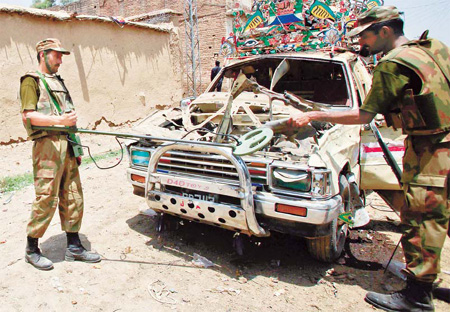More than 150 militants attack northwest Pakistan
Around 150 militants armed with rockets attacked a security checkpost in Pakistan's Waziristan on Thursday, killing eight soldiers, intelligence officials said, as tensions rise in the volatile northwestern region along the Afghan border.
 |
|
Soldiers use a metal detector to examine a vehicle that was damaged by a bomb blast in Matni town, near Peshawar, on Thursday. The bomb went off in a market near the northwestern city of Peshawar, killing four people and wounding three, officials said. [Fayaz Aziz / Reuters] |
The attack, in which at least 12 militants were killed, appeared to be part of a new strategy by the Pakistani Taliban of staging large-scale assaults on military and government targets in a bid to demoralize the army.
It came on the heels of a flurry of missile strikes by US drone aircraft in the tribal region along the Afghan border regarded as a hub of militants from around the world.
The Pakistani Taliban have intensified attacks across Pakistan in recent weeks to avenge the killing of Osama bin Laden by US special forces in the country on May 2.
The United States appears to have stepped up its drone missile strikes against militants, especially after US Secretary of State Hilary Clinton visited Pakistan recently and urged Pakistan to do more to fight insurgents.
It's not clear if Pakistan, recipient of billions of dollars in US military aid, has shared intelligence with the Americans in stepped up drone missile attacks in South Waziristan.
The CIA, which operates the remotely piloted drones, may have spotted high-value al-Qaida or Taliban militants there.
No one claimed responsibility for Thursday's militant attack on the checkpost. Last week, the Pakistani Taliban staged a similar attack in the northwest, and officials said up to 400 militants took part.
"The militants were carrying rockets and heavy weapons and attacked the checkpost shortly after midnight," an intelligence official in Waziristan said, describing the latest attack. "Eight soldiers were killed, and 12 were wounded."
Security forces hit back, killing at least 12 militants, another official said. It was not possible to verify the casualty figures. The attack took place on the border between North and South Waziristan.
Drone strikes are pounding areas of South Waziristan controlled by fighters loyal to militant leader Maulvi Nazir, who is not opposed to the Pakistani state.
His operations are limited to cross-border assaults on US-led NATO forces in Afghanistan, where the United States plans in July to start withdrawing some of its forces fighting a 10-year war against the Taliban.
Rahimullah Yusufzai, an expert on militants, said the Tehrik-e-Taliban Pakistan (TTP), or Taliban Movement of Pakistan, is attempting to both lure the army into bigger battles and draw other militants like Nazir's men into their insurgency.
"The TTP is launching attacks on security forces and army to provoke them to react. The army will have no other option to launch an offensive, even on a limited scale, if the death toll among security forces rises in Waziristan," he said.
Army offensives have failed to break the back of militants. On Thursday, a bomb went off in a market near the northwestern city of Peshawar, killing four people and wounding three, hospital officials said.
Intelligence officials say there has been an escalation of drone strikes in South Waziristan because militants have been fleeing there following speculation that the army plans an offensive in North Waziristan. Militant commanders there have denied those claims.
Pakistani army officials say there are no plans for an imminent offensive in the north.
 0
0 






